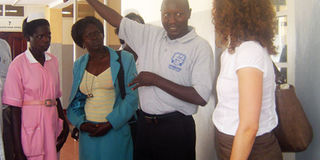Diabetes on the rise

The Arua Referral Hospital Superintendent, Dr Bernard Odu with Novo Nordisk Coordinator on Diabetes takes the nurses through one of the clinics set up for diabetic patients. Inset, many people tend to eat a diet high in sugar and fat and neglect the healthier option of vegetables and fruits.
PHOTOS BY FELIX WAROM AND ISMAIL KEZAALA.
Many people believe that diabetes is a disease for the rich, only to discover that it can affect anyone depending on what they eat, writes Warom Felix Okello.
West Nile region is geographically located in the belt of tropical disease. The most common diseases here include meningitis, cholera, plague, malnutrition and malaria. What most people do not expect to suffer from is diabetes. But the disease is creeping upon the residents of this area fast.
In that regard, Novo Nordisk is setting up clinics at Arua Referral Hospital with a dedicated group of health care professionals from Denmark to overcome the obstacles and provide care for poor and needy children.
The Diabetes Programme Coordinator of Novo Nordisk from Denmark, Ms Rikke Fabienke, said resources are often directed at communicable diseases, while chronic diseases like diabetes receive a low priority in many countries.
Diabetes is, however, the most common non-communicable disease in the region and the biggest killer, claiming about 30 per cent of deaths that occur in Arua Hospital. The disease can lead to blindness, kidney failure and amputation in the blood vessels.
The clinic consists of about seven units; a registry, nutritional unit that provides advice on diet, nurses and doctors unit, a psychology unit and a laboratory. Ms Rikke said the fully equipped laboratory would play a major role in closely monitoring each child.
She said if parents don’t give up on fast food and quick-fix meals, there’s only a slim chance that children may follow a healthy nutritive diet pattern. “We need to change the eating pattern like fatty foods that endanger the lives more,” she said.
Healthy bodies produce insulin that converts blood sugar into energy. For those people with diabetes, their bodies do not produce enough insulin so sugar builds up in the bloodstream instead of becoming energy.
Diabetes is a disease in which the body is unable to produce or unable to properly use and store glucose. Glucose backs up in the bloodstream, causing one’s blood glucose or sugar to rise too high.
Diabetics therefore must be very careful with their diet and exercise routines, and many must take insulin regularly to control their diabetic condition. Ms Florence Anguyo, whose baby suffers from diabetes, said she has been feeding the child with fatty food not knowing the effects. “Honestly, I thought diabetes was a disease for the rich, but my child is suffering from it,” she said.
The project is initiated with the aim of improving care given to diabetic children in the health care system and to decrease the high number of children admitted to the regional hospital.
The project is being implemented in Tanzania and Uganda now. Before this project, over 2,100 diabetic patients were registered. Today the clinic in Arua deals with over 50 patients weekly. Statistics indicate that majority of the cases are children.
And health experts say symptoms of insulin shock in diabetics include a shallow and rapid pulse and breathing as well as pale, sweaty and cold skin. The diabetic person is disoriented, aggressive, or irritable and may tremble, stagger, or have difficulty speaking.
It can strike children of any age, even babies. Ms Rikke said if not detected early enough in a child, the disease can be fatal and causes severe brain damage. Yet in this region, diabetes in a child is often completely overlooked.
Poor diet is another risk of diabetes amongst all ethnicities, particularly in the region. The indigenous community here reportedly has a higher sugar and fat diet and tends to neglect eating vegetables and fruits.
Under the programme, each patient is registered through a database and has a record book to help nurses monitor through visits in each unit. In addition, each patient and family member is sensitised about diabetes by the health care staff at the clinic.
The head of Diabetes at the hospital, Dr Omale William, said majority of the cases come from DRC and Southern Sudan. “We also register patients from our neighbouring countries. So we ask for increased funding from government to supplement our budget,” he said.




